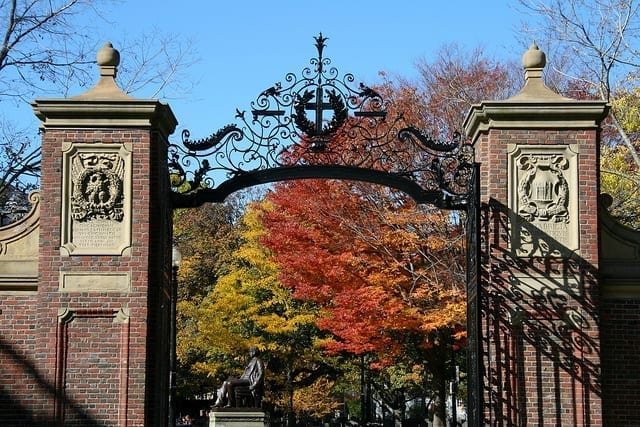Harvard alleged in its motion to dismiss that there is no law prohibiting the university from investing a portion of its endowment in the prison industry.
Harvard University has moved to dismiss a lawsuit seeking to end the school’s investment in the prison industry.
According to The Harvard Crimson, the lawsuit was filed by the Harvard Prison Divestment Campaign in February. Lodged in a Massachusetts state court, the lawsuit named as defendants Harvard University, school President Lawrence S. Bacow, and the Harvard Corporation.
In sum, activists allege that Harvard’s continued investment in the private prison industry has violated at least two Massachusetts state laws. At issue is the school’s multi-billion-dollar endowment, part of which has been invested in for-profit prisons.
Some Harvard students and alumni claim that the university should have a vested interest in combating the lasting, inter-generational effects of slavery. By funding private prisons—with the expectation that returns on investment may yield revenue for Harvard grants, scholarships, and other expenses—plaintiffs say that the school is reaping the rewards of mass incarceration.
In fact, the lawsuit goes so far as to suggest that Harvard administrators are personally benefiting from the private prison industry.
“Instead of helping to dismantle the entanglement of profiteering, government interests, and the system of human caging, Harvard makes profit off it,” the lawsuit says. “The money funds the opulent lifestyles of Harvard’s top administrators who are prison profiteers.”

The lawsuit states that the college is “in violation of fiduciary duty and breach of the Harvard Charter” in its failure to “manage the endowment ‘in good faith and with the care that an ordinarily prudent person in a like position would exercise in a similar situation.’”
The complaint also drew parallels between mass incarceration and slavery.
Harvard, however, maintains that there is nothing illegal about investing in the prison industry—and for that reason, the lawsuit should be dismissed outright.
“Even if Plaintiffs had standing—which they do not—their Complaint must be dismissed for the independent reason that they have failed to allege that Harvard engaged in unlawful conduct by making investments in prisons or companies that provide goods and services to prisons,” Harvard’s motion for dismissal said. “And indeed Harvard’s investments are entirely lawful.”
The Harvard Prison Divestment Campaign published a press release earlier this week, opposing the university’s motion.
“In the midst of uprisings for Black Lives across the country and throughout the world, Harvard continues to defend its racist profiteering through its investments in the prison-industrial complex,” the release states. “These investments uphold and expand an industry that targets and cages Black people.”
Harvard, as LegalReader reported this February, has refused to consider any changes to its endowment allocations.
University President Lawrence S. Bacow estimates that, at the present, Harvard has only invested $18,000 in prison-related businesses and industries. The Divestment Campaign claims the real number is closer to $3 million.
Sources
Harvard Files Motion to Dismiss Lawsuit over Prison Investments
Harvard Students Connect the Dots Between Slavery and Prison
Harvard Students Sue University for Investing in Private Prisons


Join the conversation!